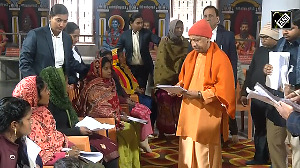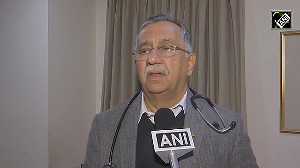 Peoples Democratic Party veteran Mufti Mohammed Sayeed was sworn-in as chief minister of Jammu and Kashmir heading a coalition with BJP which, in a clear departure from its earlier stand, agreed to maintain status quo on Article 370 in the common agenda for governance.
Peoples Democratic Party veteran Mufti Mohammed Sayeed was sworn-in as chief minister of Jammu and Kashmir heading a coalition with BJP which, in a clear departure from its earlier stand, agreed to maintain status quo on Article 370 in the common agenda for governance.
Sayeed stoked a controversy immediately after taking oath, saying credit must be given to "people from across the border", an oblique reference to Pakistan, Hurriyat and militant outfits, for "allowing conducive atmosphere" for the Assembly polls, a statement which drew sharp reaction from NC leader Omar Abdullah.
"I want to say this on record and I have told this to the prime minister that the we must credit the Hurriyat, militant outfits for the conduct of assembly elections in the state," he said.
"People from across the border allowed conducive atmosphere during elections. My humble submission is peaceful elections were not possible, if they had done something. You know how small action was needed to disturb the elections. They allowed this democratic process to go ahead. This gives us a hope," he added.
Releasing a 16-page "Agenda of the Alliance", outlining their common minimum programme, both parties agreed to maintain status quo on Article 370, which gives special status to the state.
"While recognising the different positions and appreciating the perceptions, BJP and PDP have on the Constitutional status of J&K, considering the political and legislative realities, (agreed that) the present position will be maintained on all the Constitutional provisions pertaining to J&K, including the special status in the Constitution," it said.
On the issue of controversial Armed Forces Special Powers Act, the document said the security situation in the state would be thoroughly examined and a final call will be taken.
"In this context, the coalition government will thoroughly review the security situation in the state with a view to examine the need for desirability of all the special laws being applied to the state in view of the situation improving.
"....the alliance government will examine the need for de-notifying disturbed areas. This, as a consequence, would enable the Union Government to take a final view on the continuation of AFSPA in these areas."
While PDP in its poll manifesto earlier had sought "de novo examination" of issues relating to notifying of 'Disturbed Areas' thereby paving way for withdrawal of AFSPA, BJP had been opposed any such idea.
Wishing Sayeed and his team, Modi said, "PDP-BJP govt is a historic opportunity to fulfil the aspirations of the people of J&K and take the State to new heights of progress."
The ceremony was boycotted by National Conference and majority of Congress leaders and MLAs. However, Congress state unit chief Saif-ud-din Soz, who is speculated to be on his way out, attended the function.
"PDP and BJP have entered into the governance alliance based on the agreement and agenda which is an effort towards seeking national reconciliation on Jammu and Kashmir", the Agenda document said.
Asked at the press conference whether he was dissatisfied as no agreement was reached on scrapping of AFSPA, Sayeed said "I am not at all disappointed. I am, as the chief minister, the Chairman of United Command. I will make them accountable. Mujhe maloom hai kaise mahaul ko banana hai (I know how to create the situation)."
The document said the Sayeed government will take measures for sustenance and livelihood of West Pakistani refugees and work out one-time settlement of refugees from Pak-occupied Kashmir in 1947, 1965 and 1971.
Photograph: Umar Ganie/Rediff.com









 © 2025 Rediff.com -
© 2025 Rediff.com -